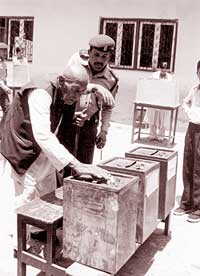 Will the elections be held on schedule? It sounds like politicians, journalists and civil libertarians are the ones asking that question the most, doesn't it? We have good reason. Our jobs will be on the line first if democracy were to disappear on a technicality. But we aren't being entirely selfish. There is a lag time before the people start suffocating. Once they do, they'll start blaming the parties, papers and pressure groups for not properly warning the rest of the country.
Will the elections be held on schedule? It sounds like politicians, journalists and civil libertarians are the ones asking that question the most, doesn't it? We have good reason. Our jobs will be on the line first if democracy were to disappear on a technicality. But we aren't being entirely selfish. There is a lag time before the people start suffocating. Once they do, they'll start blaming the parties, papers and pressure groups for not properly warning the rest of the country. The security situation across swathes of the countryside is not stable. In most insurgency-torn areas, the government barely has a presence beyond the district headquarters. (You're forced to wonder, though, what officials would actually be doing in the midst of ridges, crevasses, rivers and forests, anyway.)

But the omens aren't that bad. Under the latest delimitation of constituencies, the district-wise breakdown of House of Representatives seats goes against the Maoists. The places sending most of the MPs have terrain inhospitable to hit-and-run raids. Security officials believe polls can go ahead in about 155 of the country's 205 constituencies. That's almost three-quarters of the House membership. It would be akin to having a third of the 155 MPs elected from two constituencies. By-elections can be held in any number of phases.
If some consider coming out to vote too high a price to save the system, they're entitled to their opinion. For those who swear by the sanctity of the ballot, Prime Minister Sher Bahadur Deuba's bluster about his brigade winning a majority on an 80 percent turnout raises a red flag. The confidence with which the UML is predicting its own majority unfairly influences voters who haven't made up their minds. From the conflicting statements of top bureaucrats of the home and defence ministries, it looks like our choice may be between having a flawed election or none at all. A Deuba-led all-party election government could help us out of the dilemma. The UML could get the deputy premiership complete with the home ministry, with finance going to the RPP. The other parties in the dissolved house could work out the rest of the power-sharing deal. The parties outside parliament could be represented based on the number of statements they put out on vital national issues since the last elections. As a gesture of goodwill to the Maoists, the two facilitators during last year's peace talks could be asked to join. Getting representatives from the shadowy reactionary right on board might prove a little more difficult. They seem to hate elections more than the Maoists do, anyway.
As for fairness, let's not pretend that irregularities never existed. We probably can work out an acceptable margin by averaging the malpractices of the last three polls and doubling it in deference to the exigencies of the national crisis. A pledge to accept an outcome falling within that range would burnish our all-party commitment to save the gains of 1990. Specifically, we must resolve not to blame the Maoists for holding back people who weren't planning to vote in the first place. Subject to all-party consensus, the new parliament could serve for a two-year transitional period, extendable by a year. Once we agree that the situation has become propitious for a freer poll, we can go back to the people. Even in the best of times, trend analysis suggests, this would be the time the lower house would be ripe for dissolution.
The overriding consideration of beginning the elections on Kartik 27 is to avoid activating Article 127 of the constitution and opening another can of worms. Putting up at least one unopposed candidate could facilitate things in case meeting the deadline were to prove impossible. With the first test having been met, it would become easier to accept minor violations of democratic practice as part of an effort to save it.
Contrary to belief, Deuba's trip to Belgium wasn't entirely a fiasco. He persuaded the Belgian prime minister and most legislators that guns were an important instrument to save Nepali democracy.
Where he really excelled was in trying to get European Union monitors for the polls. Deuba should have spent an extra afternoon in Brussels to make sure those EU representatives came from countries that are also members of NATO. That way, we could brandish both carrots and sticks, draw in all those against or indifferent to elections. Right now, those who want the polls aren't nearly as fired up as those who don't. But we still have time.


